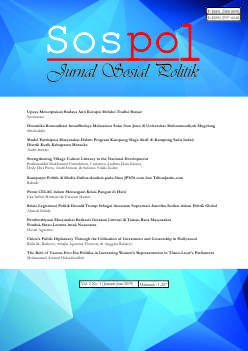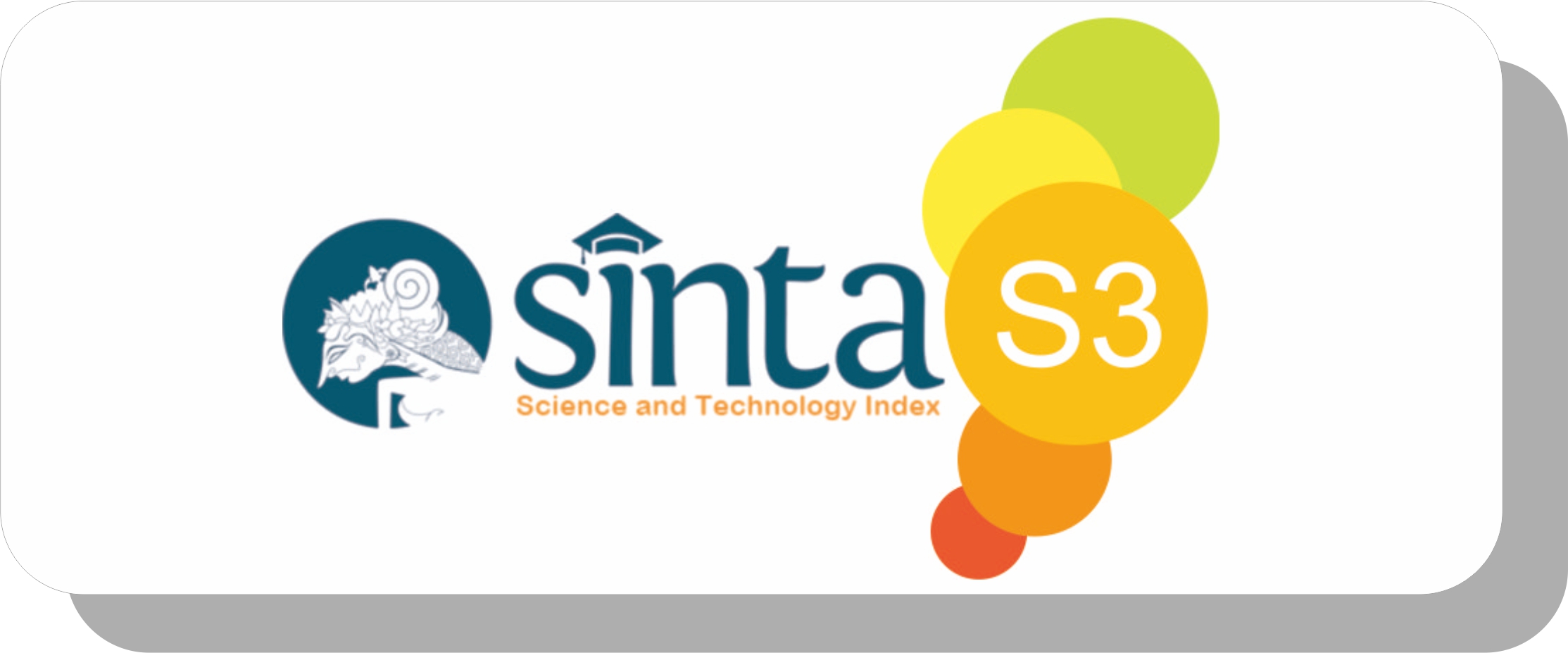Pemberdayaan Masyarakat Berbasis Gerakan Literasi di Taman Baca Masyarakat Pondok Sinau Lentera Anak Nusantara
DOI:
https://doi.org/10.22219/sospol.v5i1.7890Keywords:
Community Development, Literacy Movement, Pondok Sinau Lentera Anak NusantaraAbstract
Empowerment derived from the word ‘power’. Therefore, the main idea of empowerment in contact with the concept of power. Meanwhile, the authority itself is often attributed with the ability to make other people do what we want, regardless of their wishes and interests. Empowerment refers to the ability of the people, especially the weak and vulnerable groups so that they have the ability in some respects. This in turn makes the praxis of empowerment of communities on the territory of the literacy movement. The inclusion of community empowerment on the literacy movement to make the movement experienced a transformation from the previous only general movement based on issues that are more specific, one that is in the Pondok Sinau Lentera Anak Nusantara as setting research. The purpose of this research is to know the realization community empowerment-based literacy movement and the impact of socio-economic change in the surrounding communities. By using the theory of community empowerment and literacy theory and qualitative descriptive method, it can be noted that there is a relationship between the empowerment of community-based literacy movement toward socio-economic changes in the surrounding communities. The background and the focus of community empowerment-based literacy movement in Pondok Sinau Lentera Anak Nusantara is as follows: (1) the existence of empowerment-based literacy movement in Pondok Sinau Lentera Anak Nusantara the answer to the problems of social-historical territory of the village; (2) the realization of the empowerment funded based on the principle of volunteerism and independence; (3) the main focus of the activities of empowerment is the transformation of the values of the characters building for the productive age group as well as encourage socio-economic independence based on a series of soft skill thematic activities.
Downloads
References
Buku
Dewayani, Sofie, Pratiwi Retnaningdyah. (2017). Suara Dari Marjin: Literasi Sebagai Praktik Sosial. Bandung: Remaja Rosdakarya. Bandung: Remaja Rosdakarya.
Hikmat, Harry. (2006). Strategi Pemberdayaan Masyarakat. Bandung: Humaniora Utama.
Huraerah, Abu. (2008). Pengorganisasian Dan Pengembangan Masyarakat: Model Dan Strategi Pengembangan Berbasis Kerakyatan. Bandung: Humaniora.
Nugroho, Riant., Gunawan Sumodiningrat. (2005). Membangun Indonesia Emas: Model Pembangunan Indonesia Baru Menuju Negara-Bangsa Yang Unggul Dalam Persaingan Global. Jakarta: PT. Elex Media Computindo.
Spradley, James P. (2007). Metode Etnografi. Yogyakarta: Tiara Wacana.
Sugiyono. (2009). Metode Penelitian Kuantitatif, Kualitatif Dan R & D. Bandung: Alfabeta.
Suharto. (2005). Membangun Masyarakat Memberdayakan Rakyat: Kajian Strategis Pembangunan Kesejahteraan Sosial Dan Pekerjaan Sosial. Bandung: Refika Aditama.
Laporan, Jurnal, Artikel
Agustin, Sri., Cahyono, B. E. (2017). “Gerakan Literasi Sekolah Untuk Meningkatkan Budaya Baca Di SMA Negeri 1 Geger.” Linguista Vol. 1 (2): 55–62. http://e-journal.unipma.ac.id/index.php/linguista.
Ariyani, L. P., Mudana, W., Atmadja, N. B., & Purnawati, D. M. (2017). “Pemberdayaan Pemuda Dalam Pengembangan Perpustakaan Desa Untuk Meningkatkan Kemampuan Literasi Masyarakat.”
Didiet, Widiowati. (2018). “Pemberdayaan Masyarakat Berbasis Aset Komunitas.” JSPS 1 (2). https://jurnal.unej.ac.id/index.php/jsps/article/view/8691.
Faradina, Nindya. (2017). “Pengaruh Program Gerakan Literasi Sekolah Terhadap Minat Baca Siswa Di SD Islam Terpadu Muhammadiyah An-Najah Jatinom Klaten.” Jurnal Hanata Widya 6 (8).
Harun, Zulkarnain. (2014). “Model Strategi Pemberdayaan Masyarakat Melalui Pengembangan Pariwisata Yang Berbasis Komunitas Lokal: Kasus Di Kota Padang Panjang.” JANTRO 16 (1). http://jurnalantropologi.fisip.unand.ac.id/index.php/jantro/article/view/15.
Hidayat, M. H., Basuki, I. A., & Akbar, S. (2018). “Gerakan Literasi Sekolah Di Sekolah Dasar.” Jurnal Pendidikan 3 (6): 810–17. http://journal.um.ac.id/index.php/jptpp/article/view/11213/5360.
Hilman, Yusuf Adam., Nimasari, E. P. (2018). “Model Pemberdayaan Masyarakat Desa Berbasis Komunitas.” ARIST 6 (1). http://journal.umpo.ac.id/index.php/aristo/article/view/778/597.
Pusut, R., Kimbal, M., & Mamentu, M. (2017). “Pembangunan Berbasis Pemberdayaan Masyarakat Di Desa Pasir Putih Kecamatan Pamona Selatan Kabupaten Poso.” Jurnal Eksekutif 2 (2).
Ridlwan, M. A., Muchsin, S., & Hayat. (2017). “No Title.” 2 (2): 141–58. https://journal.unnes.ac.id/nju/index.php/jpi/article/view/9933/6420.
Saharudin. (2009). “Pemberdayaan Masyarakat Miskin Berbasis Kearifan Lokal.” Jurnal Transdisiplin Sosiologi, Komunikasi dan Ekologi Manusia 3 (1): 17–44.
Sujarwo, Tristanti, & Santi, F. U. (2017). “Pengembangan Model Pemberdayaan Perempuan Desa Wisata Melalui Pendidikan Berbasis Komunitas.” Jurnal Penelitian Ilmu Pendidikan 10(1). https://journal.uny.ac.id/index.php/jpip/article/viewFile/16798/9944.
Yanto, A., Rodiah, S., & Lusiana, E. (2016). “Model Aktivitas Gerakan Literasi Berbasis Komunitas Di Sudut Baca Soreang. Jurnal Kajian Informasi Dan Perpustakaan.” 2 (1): 107–18.
Artikel Daring
Efendi, David. (2017). “Mencari Model Gerakan Literasi Masyarakat.” https://www.researchgate.net/publication/320627639_Mencari_Model_Gerakan_Literasi_Masyarakat_1.
Izzah, Imarotul. (2018). “Jumlah TBM Terus Berlipat.” https://radarmalang.id/jumlah-tbm-terus-berlipat/.
Rifa’i, Bahtiar. (2017). “Dukung Literasi Antikorupsi, KPK Sumbang 2.500 Buku Ke TBM Di Serang.” https://news.detik.com/berita/d-3482101/dukung-literasi-antikorupi-kpk-sumbang-2500-buku-ke-tbm-di-serang.
Very. (2018). “Gerakan Literasi Mencegah Bahaya Radikalisme.” http://indonews.id/artikel/13502/Gerakan-Literasi-Mencegah-Bahaya-Radikalisme/.
Koran, Surat Kabar, Majalah
Agustino, Hutri. (2018). “Strategi Gerakan Literasi Di Era Globalisasi”. Malang Post 2 Februari 2018.
Wawancara
Rahma Fitri. (2018). Desa Mojosari, 24 Juli 2018.
Triasasi. (2018). Desa Mojosari, 24 Juli 2018.
Wahyu. (2018). Desa Mojosari, 24 Juli 2018.
Downloads
Published
How to Cite
Issue
Section
License
Authors who publish with this journal agree to the following terms:
- Authors retain copyright and grant the journal right of first publication with the work simultaneously licensed under a Creative Commons Attribution-ShareAlike 4.0 International License that allows others to share the work with an acknowledgement of the work's authorship and initial publication in this journal.
- Authors are able to enter into separate, additional contractual arrangements for the non-exclusive distribution of the journal's published version of the work (e.g., post it to an institutional repository or publish it in a book), with an acknowledgement of its initial publication in this journal.
- Authors are permitted and encouraged to post their work online (e.g., in institutional repositories or on their website) prior to and during the submission process, as it can lead to productive exchanges, as well as earlier and greater citation of published work (See The Effect of Open Access).

This work is licensed under a Creative Commons Attribution-ShareAlike 4.0 International License.



















